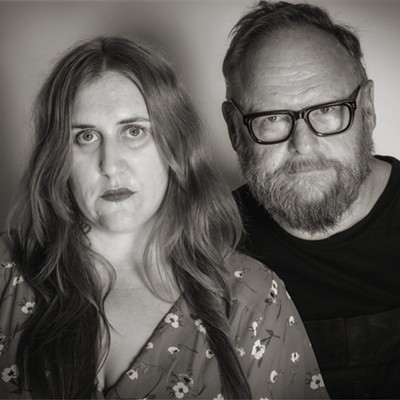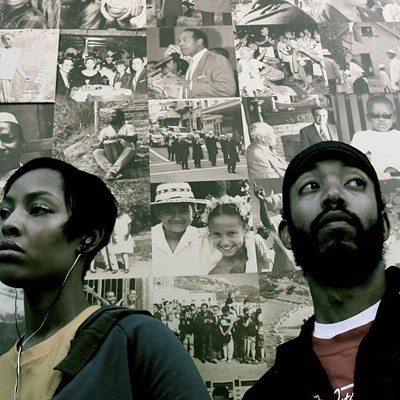But upon closer inspection, Bazan's Arizona roots make sense: As easy as it is to write off Pedro the Lion as depressing, slit-your-wrist music, the sadness is only skin deep. Underneath the stories of failed politicians, marriages and families, there is something uplifting in Bazan's songs, something redemptive and forgiving in all the sex and booze that color the tracks. Bazan confronts the denizens of 21st-century middle-class life and doesn't try to idealize their lives. In Bazan's songs, people have extramarital affairs in cheap motel rooms; they go to Grandma's house for tea and cake and leave their little brother wandering lost in the woods; they admit they like girls better when they shave their legs; they disappoint their parents; and they may not love Jesus every day. And it's OK. The people in Bazan's songs are real. They screw up and they may be unhappy, but listening to their stories is kind of like watching bad TV: Your own life, suddenly, doesn't seem so dire in comparison.
Bazan got his rock and roll start playing in hardcore bands in high school with fellow Seattle songwriter Damien Jurado. "The first day that I met him at school we actually went over to another friend of ours' house, named Brian, and we started playing rock music together, me playing drums, Damien played guitar. It was hardcore. Chchn chchn," explained Bazan, making guitar noises. From there, Bazan ventured into the realm of pop music and started writing songs that were very un-hardcore.
"When I started writing songs on the guitar I just didn't really have the kind of voice that was good for hardcore music and I was really into a lot of pop bands. You know, rock and roll, so it was really unnatural for me to play super distorted, aggressive, screamy kind of music," said Bazan. "Although I really wanted to, whenever I would do it, it just sounded like really bad emo."
Hence, Pedro the Lion was born. The name comes from a character in a children's story Bazan made up, but as luck would have it, the band worked out better than the story.
"The story was horrible," said Bazan. "It was just about this lion who got kicked out of--I don't know what you'd call it, the pride or whatever--because he was kind of a mean kid or whatever. I don't know. It was just really bad."
The band is predominantly Bazan, but for the current tour promoting this year's Control (Jade Tree), Pedro the Lion has Casey Foubert, who played drums on the last two Pedro records, and a guy named Christian playing guitar. "It's a rock band," said Bazan.
Pedro the Lion has been a loud rock band at times and the outlet for Bazan's quieter musical side at others. But even at its most simplistic, the songs resonate with intensity. Control is the story of a failing marriage: The first song has a couple walking along the beach and one saying to the other, "I could never divorce you/ without a good reason/ though I may never have to/ it's good to have options." The next song, "Rapture," shows the husband in the throes of adultery: "This is how we multiply/ pity that it's not my wife." Later on the record are two more songs about infidelity, and the saga culminates with "Priests and Paramedics," where the wife kills the husband with a knife.
Not that Bazan is condoning unfaithfulness; he's merely acknowledging its existence and exploring the emotions and factors involved. Bazan is Christian and the fact that many of his songs are spiritually themed leads many to conclude that Pedro the Lion is more Christian rock than indie rock. But he's not preaching anything.
"The prevailing notion of Christian music is that the singer or the writer is attempting to present a message, and through that message, trying to convert people to their way of thinking," said Bazan. "I think that that just contradicts the purpose of what art is and what music is, in that I feel like it's art, and so that's not really what I'm trying to do. I think if I was to sit down and have a conversation about it, I'm not sure if they would categorize me personally as a Christian or not, but nonetheless I value the Bible and Jesus's teachings and whatnot, but how it interacts with the music is really kind of up to the moment of creativity and doesn't really have anything to do with me setting out to write about certain things or having an agenda or anything like that."
Bazan's original plan for Control was political: Living in Seattle, he was inspired by the WTO meeting and anti-globalism demonstrations a couple years ago to make a record that reflected his liberal ideology.
"I started reading more liberal, politically left books and what I was reading really resonated with the meetings and the way that I saw things and understood things, and it made sense of a lot of things that I had previously been unable to harmonize, just in my mind, so I really wanted to represent that on the record," said Bazan. But somewhere along the way, that plan took the backburner. "I realized that even though I really cared about those things it probably was a bad idea to set out to write about that."
Control does, however, have an underlying thread of disgust with stereotypically middle-class obliviousness.
"It just so happened that because I was concerned about certain issues politically and whatnot some of those things came out, and then there are a lot of other elements of the record that are very unpolitical and very domestic or whatever," said Bazan. "I definitely think if it's in there and it's important, it'll come out."
The rest of Control deals with more socio-economic themes: cookie-cutter families where the wife lays by the pool and the children are all spoiled, living in a world where "Thanks in part to Mother Nature it will never rain again/ should do wonders for the GNP." The album ends on a somewhat flippant note: "Wouldn't it be wonderful if everything were meaningless?" Bazan asks, adding, "But everything is so meaningful and most everything turns to shit. Rejoice."
So where's the sunshine in that? It may seem strange for Bazan to be asking us to rejoice if everything turns to shit, but as the music swells and Bazan's deep, detached voice maintains a choir-like echo, the rejoicing makes sense: This is just how things are, and in acceptance comes understanding.











